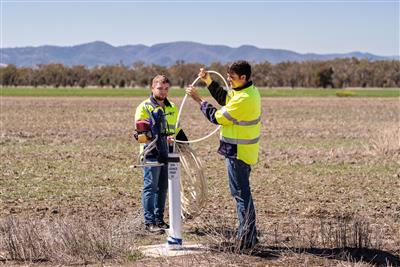The laboratory currently offers a number of test packages which have been developed to meet our clients’ needs and requirements, including:
 Rainwater Tank - Drinking Water
Rainwater Tank - Drinking Water
Leaves, animal droppings, dust etc. that has accumulated on your roof and in your gutters can quickly degrade the quality of rainwater. We can offer bacteriology testing (Total Coliforms/Faecal Coliforms/E coli) to ensure your tank water is safe to drink. We are also able to offer other testing (e.g. heavy metals, pesticides) if you think you may have a particular issue.
For more information on rainwater tanks, click here (PDF 1.4MB).
The Australian Drinking Water Guidelines 2011 also provide useful information on safe drinking water.
 Bore Water
Bore Water
Bores can be a very useful source of water, particularly in times of drought. The quality of bore water can vary significantly depending on the depth of the bore and surrounding land uses. We test for pH, Conductivity, Salinity, Calcium, Magnesium, Sodium, Chloride, Sulphate, Alkalinity (as Calcium Carbonate), Total Hardness, Calcium Hardness, and Nitrate/Nitrite. From these tests we can provide assistance in determining the suitability of your bore water for irrigation, stock or domestic use. Please note, that if bore water is intended to be consumed, we strongly recommend testing for bacteriology as per the drinking water package above.
Bores are particularly prominent on rural properties so for information on farm water quality and treatment, click here (PDF 1.8MB).
 Sewage Treatment Plan (including home)
Sewage Treatment Plan (including home)
Ensure that your sewage treatment is working effectively and compliant with any license conditions. Typical tests are: pH, Conductivity, Total suspended Solids, Biochemical Oxygen Demand, Total nitrogen, Ammonia, Total Phosphorus, Nitrate/Nitrite, Oil & Grease, and Faecal Coliforms.
We can also offer health testing packages of swimming pools/spas, and can tailor a testing package to specific requirements. Contact us today to find out more.
We are able to offer assistance with general interpretation of analysis results against Australian Drinking Water Guidelines, NSW DPI guidelines for stock and irrigation and license compliance. It should be noted that information provided is general guidance and strongly recommend you seek professional assistance if you require information related to something specific.
For information on interpreting water quality test results, click here.